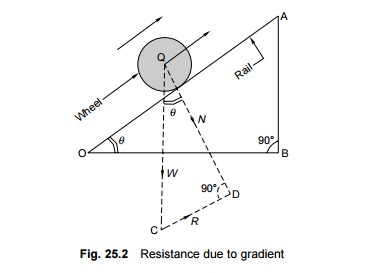Chapter: Civil : Railway Airport Harbour Engineering : Railway Engineering : Train Resistance and Tractive Power
Train Resistance Due to Gradient
Various forces offer resistance
to the movement of a train on the track. These resistances may be a result of
the movement of the various parts of the locomotives as well as the friction
between them, the irregularities in the track profile, or the atmospheric
resistance to a train moving at great speed. The tractive power of a locomotive
should be adequate enough to overcome these resistances and haul the train at a
specified speed.
Resistance Due to Gradient
When a train moves on a rising gradient, it requires extra
effort in order to move against gravity as shown in Fig. 25.2.

Assuming that a wheel of weight W
is moving on a rising gradient OA, the following forces act on the wheel.
(a) Weight of
the wheel (W), which acts downward
(b) Normal
pressure N on the rail, which acts perpendicular to OA
(c) Resistance
due to rising gradient (R4), which acts parallel to OA
These three forces meet at a
common point Q and the triangle QCD can be taken as a triangle of forces. It
can also be geometrically proved that the two triangles QCD and AOB are
similar. From D QCD,
R = W sin q
From D OAB,
R = W ´ AB / OA
In actual practice, the gradients are very small and,
therefore, OA is approximately equal to OB. Therefore,

This means that if the weight of the train is 50 t and the
slope is 1 in 50 (2%), the resistance due to gradient is

It may be noted here that when a train ascends a slope, extra effort is required to overcome the resistance offered by the gradient. The position is, however, reversed when the train descends a slope and the resistance offered by the gradient helps in the movement of the train.
Related Topics